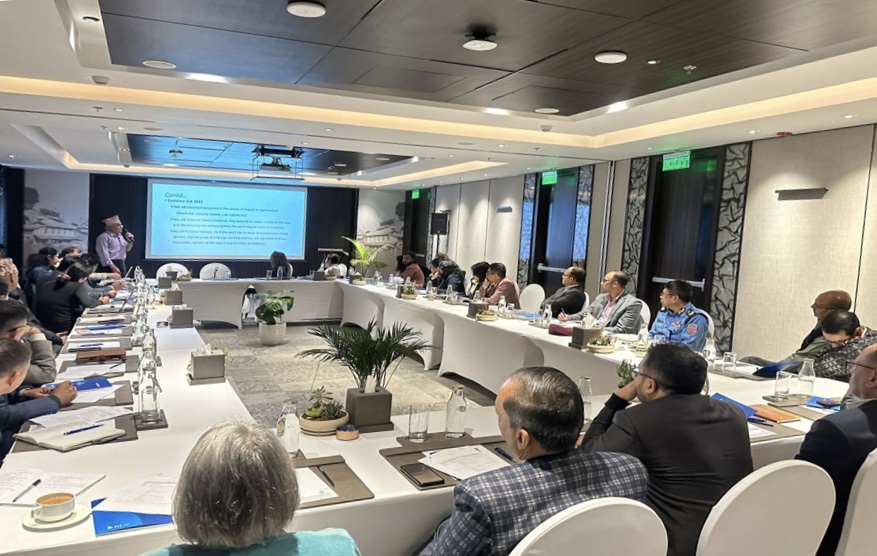On March 25 2024, the International Commission of Jurists and Advocacy Forum-Nepal organized an expert consultation in Kathmandu, bringing together 30 forensic fields, including forensic specialists, archaeologists, psychiatrists, psychosociologists, police, prosecutors, and human rights defenders. The purpose of the event was to advance accountability and access to justice in transitional justice process by building the country’s capacity in this critical area.
Experts evaluated the existing laws and expertise of agencies and individuals involved in forensic investigations of gross human rights violations and abuses in Nepal, including those resulting from the armed conflict from 1996 to 2006. They assessed recent progress and identified areas requiring development and reform.
Dr. Mandira Sharma, ICJ Senior International Legal Adviser, underscored the urgency of addressing the plight of families affected by enforced disappearances, stressing the need to preserve critical evidence, particularly DNA reference samples, essential for search and identification efforts:
“Families of some three thousand persons that may have been subjected to enforced disappearances are waiting for the truth, justice, and reparation for the last two decades. Memories of family members are fading away, some are getting old and dying, and we are losing important evidence. There is an urgent need to protect evidence, most importantly the reference samples for DNA, which remain critical for the search and identification of disappeared individuals.”
Participants considered challenges arising from inadequate legal provisions, resource constraints, and a lack of coordinated approach in using forensic tools and techniques. They emphasized the need for a cohesive strategy and enabling legal framework for scientific fact-finding and investigation, including exhumation, DNA collection/examination/preservation, and the involvement of families of victims.
Family members of persons likely to have been victims of enforced disappeared shared their experiences, highlighting the emotional toll of being excluded from exhumation processes by authorities and the need for legal and policy measures to ensure their inclusion in exhumation processes.
Dr. Harihar Wasti, a leading forensic expert in Nepal, emphasized the importance of coordination among various forensic sectors involved in search and identification efforts:
“We have some experiences, and we are constantly learning. However, it is important to have a dedicated institution taking responsibility for investigating cases involving enforced disappearances and coordinating different sectors of forensic science in the search and identification of disappeared individuals.”
ICJ Asia Pacific Director Melissa Upreti reaffirmed the ICJ’s commitment to facilitating knowledge sharing and drawing from comparative experiences, including those from other regions like Latin America, to advance forensic investigation practices in Nepal.
Background
The armed conflict in Nepal, spanning from 1996 to 2006, between the Government of Nepal and the Communist Party of Nepal (Maoist), witnessed widespread international humanitarian law and human rights violations and abuses, including unlawful killings, torture and ill-treatment, including rape and other sexual violence, enforced disappearances.
In November 2006, the parties to the conflict signed the Comprehensive Peace Agreement (CPA), marking the cessation of hostilities. They committed to establishing high-level truth commissions within 60 days of signing the Agreement to disclose the fate and whereabouts of “disappeared” individuals and to provide justice and reparations to victims of gross human rights violations and abuses during the conflict.
In 2014, the parliament passed the Commission of Inquiry on Enforced Disappearances, Truth and Reconciliation Commission Act (TRC Act). Consequently, the Government of Nepal established two commissions in 2015: the Truth and Reconciliation Commission (TRC) and the Commission of Investigation on Enforced Disappeared Persons (CIEDP). Despite receiving more than 60,000 complaints, the TRC and the CIEDP have yet to conduct effective investigations or determine the fate of any disappeared individuals.
The National Penal Code, enforced in August 2018, provides for criminal liability for enforced disappearances. However, investigating authorities have refrained from utilizing this law to probe allegations of enforced disappearances, citing the jurisdiction of the transitional justice commissions over conflict-era cases.
As the transitional justice process faces delays and authorities fail to implement the new legal framework, many relatives of victims are passing away or aging, and witnesses are losing their recollections. Recognizing the imperative of preserving evidence for achieving justice and accountability for violations during the conflict, the ICJ and its partner organizations have undertaken advocacy around documentation evidence and memories of affected families. This includes mapping existing domestic laws, agencies, and individuals involved in forensic investigations, collecting ante-mortem data, conducting exhumations, and collecting and examining DNA for the identification of disappeared persons.




